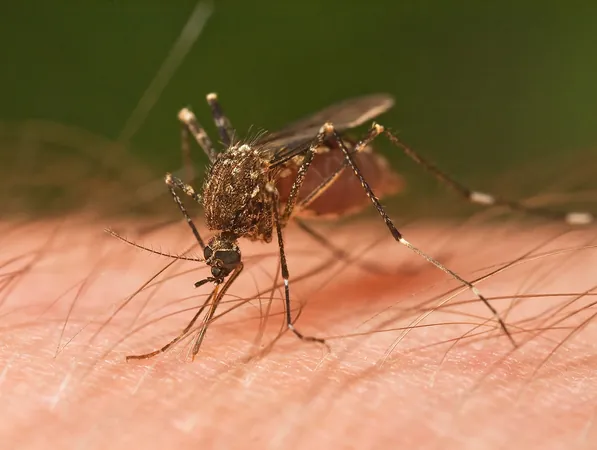
Climate Change Linked to Surge in Dengue Cases: A Scary Prediction for the Future
2024-12-06
Author: Nur
Climate Change and Dengue Fever
Recent research reveals that nearly one-fifth of dengue fever cases in Latin America and the Caribbean—approximately 45 million infections annually—are directly attributable to climate change. This alarming figure comes from a groundbreaking study conducted by researchers from Harvard and Stanford Universities.
As urbanization and deforestation expand, rising temperatures are creating ideal breeding conditions for the Aedes aegypti and Aedes albopictus mosquitoes, which are responsible for the transmission of dengue. This study is the first of its kind to meaningfully quantify the impact of climate change on the increasing prevalence of dengue fever, often referred to as "break-bone" fever due to the severe pain it causes.
Record Cases and Vaccine Challenges
Last year marked a record number of dengue cases and fatalities in both Latin America and the Caribbean. Despite the approval of two new vaccines—Takeda's Qdenga® and Sanofi's Dengvaxia—the slow rollout and production challenges have limited their effectiveness.
Projections and Climate Mitigation
The researchers analyzed data from 21 countries across the Americas and Asia, projecting that under a high CO2 emissions scenario, dengue incidence could soar by 61% by 2050. However, proactive climate mitigation efforts could reduce this increase to approximately 40%. Astonishingly, around 257 million people currently live in regions where warming temperatures could double dengue cases by mid-century under either scenario.
Dr. Kelsey Lyberger, an ecologist at Arizona State University and a co-author of the study, emphasized the pressing need for global policy actions to mitigate climate change, stating, "The magnitude of dengue cases will not increase equally… some places with currently low burdens could see the highest relative increases."
Impact of Temperature Fluctuations
Temperature fluctuations are already altering the landscape of infectious diseases, particularly vector-borne illnesses like dengue. The study highlights that current temperature rises are responsible for an estimated 45 million excess dengue cases.
Interestingly, dengue's relationship with average daily temperatures is non-linear; it peaks at around 28°C and then begins to decline. This means global warming will disproportionately affect regions that currently experience cooler climates. For instance, countries like Mexico, Peru, Bolivia, and Brazil could see increases in dengue incidence by over 150% due to climate change.
Surveillance Gaps and Global Response
Unfortunately, the study's findings also reveal gaps in dengue surveillance, particularly in Africa, India, and parts of the Western Pacific. The lack of robust surveillance systems has left experts unsure about the disease's spread in these regions. While countries in the Americas, especially Brazil, have implemented tracking methods, many African nations face significant hurdles in case detection and management.
India, meanwhile, grapples with insufficient surveillance leading to vast underreporting, making effective public health responses to outbreaks nearly impossible. The WHO attributes the increasing dengue cases in South Asia to a combination of climate change, population growth, inadequate water supply, poor waste management, and the absence of effective treatment protocols.
Call to Action
In light of these findings, researchers hope that countries burdened by high dengue rates will ramp up their tracking efforts. Simultaneously, regions that have historically experienced fewer cases should prepare for potential outbreaks by investing in surveillance and integrated vector management.
As reported by Dr. Erin Mordecai, a senior author of the study, “The evidence suggests that climate change has already become a significant threat to human health, and for dengue in particular, our data indicates the impact could worsen dramatically.”
As we brace for the future, the world must acknowledge that climate action is not only an environmental necessity but also a public health imperative. Prepare now—before it’s too late!


 Brasil (PT)
Brasil (PT)
 Canada (EN)
Canada (EN)
 Chile (ES)
Chile (ES)
 España (ES)
España (ES)
 France (FR)
France (FR)
 Hong Kong (EN)
Hong Kong (EN)
 Italia (IT)
Italia (IT)
 日本 (JA)
日本 (JA)
 Magyarország (HU)
Magyarország (HU)
 Norge (NO)
Norge (NO)
 Polska (PL)
Polska (PL)
 Schweiz (DE)
Schweiz (DE)
 Singapore (EN)
Singapore (EN)
 Sverige (SV)
Sverige (SV)
 Suomi (FI)
Suomi (FI)
 Türkiye (TR)
Türkiye (TR)